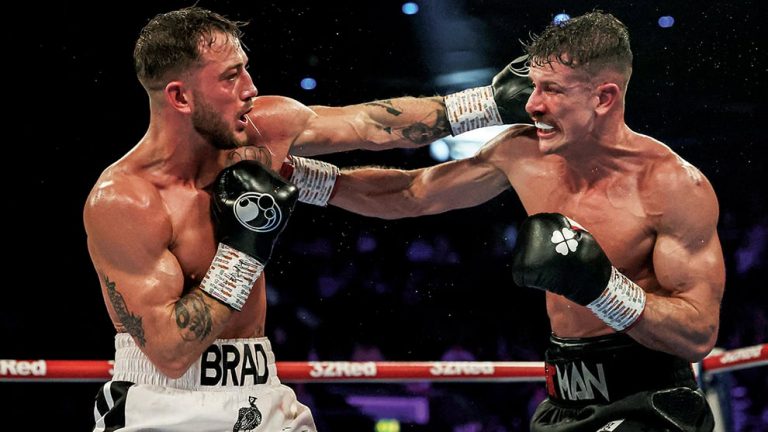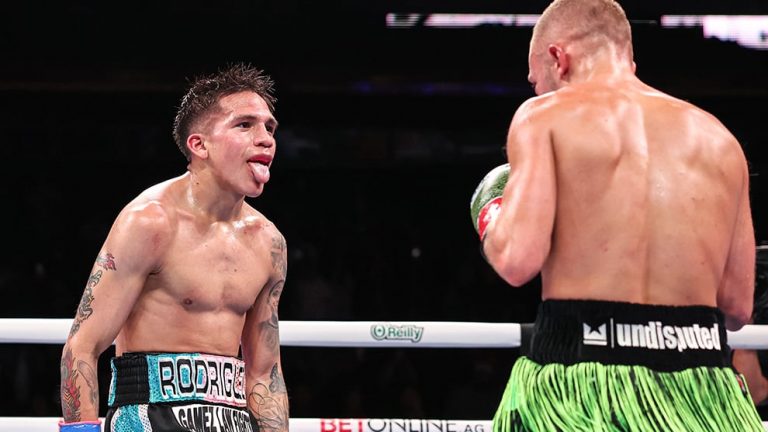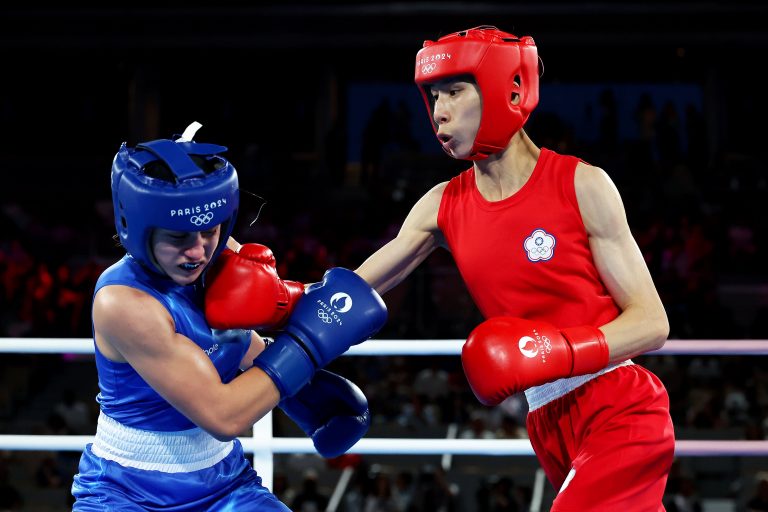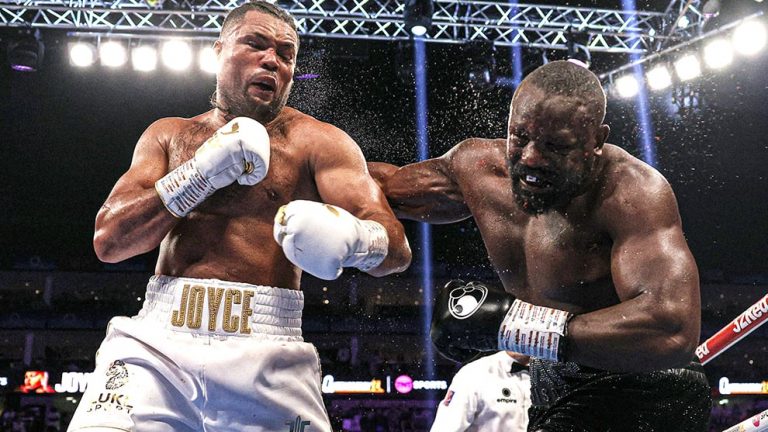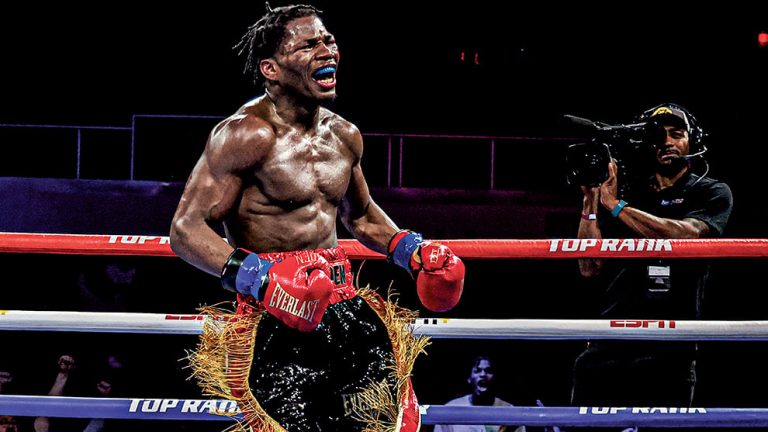Brandon Scott: “They see my tics and say I’ve got a brain injury”
(Interview by Louis Evans)
BN: How strategic are your publicity stunts?
BS: I understand the difference between amateur boxing and professional boxing. One’s a sport, and the other is a business disguised as a sport. If you’re not marketing yourself, people won’t wanna watch you. You’re not gonna get very far.
It’s very hit-and-miss. The Forrest Gump thing [Brandon travelled to Dublin dressed as Forrest Gump for Matchroom’s Fight Day 5k, amusing promoter Eddie Hearn] was to get my Matchroom contract. It was purely strategic. But that was a complete joke with Ebanie Bridges [where Brandon initiated a viral, flirtatious social media exchange]. It was in The Sun and The Daily Star! I was just trying to be a cheeky teenager at the time.
For some things, I promise I’m not trying to go viral; I’m just trying to have fun. I’m a young boy chasing his dreams. What else could I ask for? Apart from Ebanie Bridges.
BN: What added pressure has your showmanship created?
BS: When I started boxing, I was laughed at; they [bullies] told me I was too small. I’ve got Tourette’s syndrome, too. Between that and ADHD, they get on like a house on fire. I had my first fight at 13, and by 15, I was the British [amateur] champion, boxing all over Europe. People never thought I’d do that, but I did it. They never thought I’d be a professional boxer, but here I am. Then I said, ‘I’m going to steal this Matchroom show.’ Without being brash, I did that, too.
My biggest confidence gainer is that I haven’t been proven wrong yet. Everything I’ve said I’d do, I’ve done. I honestly don’t care what people think. Having Tourettes and being bullied from such a young age, I’ve had things that would crush most people and destroy their confidence, but I’ve used it to my advantage. I’ve got bulletproof skin!
I love Mike Tyson, but let’s face facts: if Mike didn’t like me, he’d just stand on me. I can’t take the name ‘The Baddest Man on the Planet.’ ‘The Baddest Nerd’, on the other hand… I’m pretty sure I could go to ComicCon and be the last person standing. I’ll take it! I don’t shy away from things others see as disadvantages; I want to make them work for me.
Different social media apps have very different ratios of positivity. Instagram, Facebook and TikTok – we’re all friendly. Twitter, on the other hand, is out for my blood. They want my head on a stick! People go on Twitter to let out their anger on me. They’re arguing with their wife or something and it’s, ‘Where’s that fucking Brandon Scott!’
I only used my phone to post on fight week because I’m very focused. My parents sift through the comments, and I have to assure them it doesn’t matter. In the last fight, I had to shout at some of my team because they reacted so emotionally to comments. They say you’re a product of your environment, and people around me were starting to get affected. If they’re annoyed, I’m annoyed because I care about them. Like Mr. Miyagi in The Karate Kid, the best defence is, ‘No be there.’
However, others say I’m a breath of fresh air, and they can’t wait to see me fight next. The ones affecting me most are kids opening up about their stories like I have with mine. Those messages twist and turn my heart. They make me feel so good because they remind me of myself. I wish I had someone to look up to when I was younger. No one in boxing said it was okay to be different. If there’d been a role model like myself when I came through, I would’ve been more at ease.
BN: Your childhood obesity is well documented. When was the turning point?
BS: It struck home when I started getting ill a lot. Mum took me to the doctor, and they showed me a graph. There was ‘normal’, ‘overweight’ and ‘obese’ – and way beyond the obese point, there was me. I was beyond morbidly obese! He [the doctor] warned it would affect my health if I didn’t do something about my weight. That meant so much more. It wasn’t a kid trying to make fun of me; this was a trained professional trying to help. That’s when the flip switched.
BN: How did attitudes towards you change after shedding the weight?
BS: I’m an obsessive person. Since 12, I trained every day. Never went out drinking; never been to a house party with friends. I’d come home at 3.30 [pm], be in the gym at 4, and not back until 8.
The bullying continued when I started boxing. They [the bullies] teased me for that, too. I was very small, and the bigger kids would try to spar me. I isolated myself from those people and stopped going to school. I worked up a deal with the headmaster to leave early two times a week and never went out with friends after school. My head was purely on boxing and weight loss. The bullying never stopped; I just took it away from them.
BN: What are the biggest obstacles you face as someone with Tourette Syndrome?
BS: People don’t understand we can’t help it. Tourettes come in many shapes and forms. Some [people with Tourettes] will say horrible things, and some will twitch or make little noises. I could say words one day; I hope I don’t. It’ll make my press conferences a living nightmare. I’ll have to tape my mouth closed!
What sets it off most is a single bright light. It’s horrible because, in most interviews, there’s a massive light above the camera. It drives me fucking crazy! When I’m speaking, I look like I’m having a seizure. In the comments, people say I’ve been hit in the head too many times, and it’s a sign of a brain injury. One guy commented, ‘Blink if you’re gay.’ I can live with the ones [facial tics] I have now. Honestly, you learn just to live with it.
BN: How vindicating are your achievements in boxing?
BS: [Undercarding] The Anthony Joshua fight left a sour taste in my mouth because of what I made of it. Now it’s done, it’s one of my proudest moments. I took the fight on a week’s notice and had to lose over a stone in four days – I was in Magaluf when I got the call! It [cutting the weight] wasn’t nice.
It was a hard opponent on paper, especially for where I am in my career. He was messaging me online, saying he was gonna beat me. It was my first time experiencing that, and I didn’t know how to take it. Then there’s the infamous press conference where I got labelled ‘David Brent’!
I could see how the week was affecting everyone around me. It was the first week in my life where I nearly succumbed to pressure. Thankfully, I had a good team around me – my father in particular – who kept my eye on the prize. Fuck, I wanted that to be over with.
BN: Who were your idols growing up?
BS: Spider-Man. Stan Lee [Spider-Man’s creator] said, ‘What makes Spider-Man great is he could be anyone.’ That’s why he wears the mask. Peter Parker [Spider-Man’s secret identity] is a nerd! But when he puts the mask on, he can climb buildings, he’s got super strength, he’s awesome! However, his morals always stay the same; he’s a good person who wants to do the right thing. That’s what makes him so cool.
People who’ve been bullied or who’re struggling will turn to him because he’s one of us. He’s not letting his shortcomings hold him back. I don’t wanna be someone who throws money around or who’s cool. ‘Yeah, Brandon might be a nerd, but when he’s in that ring, he fights like a superhero!’ We all need a bit of Spider-Man in our lives.
I was browsing the comics the other day in HMV and a guy in an Iron Man 3 t-shirt approached me and asked if I was Brandon Scott. It’s about as far away from a boxing environment as possible. I’m gonna bring the nerds into boxing and show the world how bad we truly are!
BN: To what extent is ‘nerd culture’ still uncool?
BS: We live in a world where everything is changing. Back in the 80s, a nerd would be someone in glasses who loves maths. The ‘superheroes’ were the likes of Sylvester Stallone and Arnold Schwarzenegger – huge 7’5” men with eight packs and muscles bigger than my whole body.
Now, a lot of the new superheroes are nerds. It’s a great thing. Nobody should be made to feel left out because of the way they look. Ben Whittaker loves anime; he makes it cool. I don’t know or care if I make it [nerd culture] cool, but I’m making it work for me. The world is a lot more accepting now.
BN: What do people underestimate most about you?
BS: My boxing ability. Since my second fight, I’ve had a really bad hand injury. The X-ray didn’t show anything broken; I didn’t know what the issue was, but my tendons and ligaments were both badly damaged. I’ve had one hand in my last four fights, including the two with Matchroom. I’ve been in a prime position to chin someone with a right hand, but I’ll hit them with a jab. When I fight, I’m ferocious; I wanna attack. But the injury has held me back.
I shouldn’t have done my third fight. That was stupid but I needed the fourth fight to join the Matchroom show. I couldn’t even warm up; my hand was that bad. Then, I couldn’t afford to miss the [Cardiff] Matchroom card. I took a load of ibuprofen and paid for a top-quality hand wrapper. I just needed it to last as long as possible, and it went in the second round! I was finally gonna take a proper break and get treatment. Then I got the call for the Anthony Joshua undercard. No way in hell I could turn that down; I’d have fought with no arms and legs. It was a dream come true.
I look forward to showing people how good I am; I know how good I can be. I’m gonna shock a lot of people.
BN: What do you do better than anyone else?
BS: I’ve got balls. It takes a lot of courage to do the things I do before a fight. Being a showman, when you’re going into a fight, if you lose or don’t do well, your arse is on a stick for the British public to roast. It’s scary.
BN: What’s your chief motivation in boxing?
BS: Women and money! Let’s not beat around the bush [laughs].
BN: What legacy do you hope to leave as a boxer?
BS: Someone who defied all the odds. The guy who went for the world title, who went for Ebanie Bridges – the things he wasn’t supposed to have. The person who relentlessly attacked and persuaded until he got what he wanted. I haven’t given up on Ebanie; we’re just playing the long game. Someone who never sold out, someone who never let people change him. That’s it.

